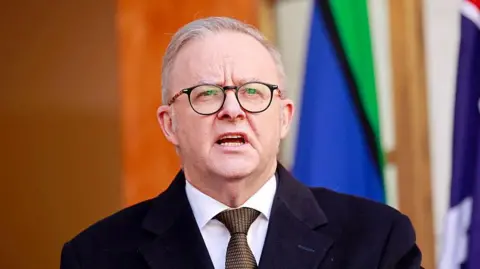In a significant diplomatic development, Australia is set to officially recognize the state of Palestine in September. This decision aligns with similar actions taken by other countries, such as the United Kingdom, France, and Canada, signaling a shifting perspective on the recognition of Palestinian statehood in the international arena. The announcement was made by Australian Prime Minister Anthony Albanese, who emphasized the importance of a two-state solution as the optimal pathway towards stability and peace in the Middle East.
At a press conference, Prime Minister Albanese stated that the planned recognition will take place during the United Nations General Assembly. He indicated that this decision to recognize Palestine came after receiving commitments from the Palestinian Authority, which governs parts of the West Bank. Albanese communicated his belief that a two-state solution is essential to ending violence and alleviating suffering in regions like Gaza, where humanitarian crises have escalated in recent months due to ongoing conflicts.
Albanese’s comments came amidst growing criticisms aimed at Israel regarding its military operations in Gaza, which have been condemned by many as excessive in response to the attacks launched by Hamas. The Israeli government has expressed its discontent with Australia’s impending move, suggesting that recognizing a Palestinian state equates to rewarding terrorism. The Israeli leadership maintains that this recognition undermines the prospects for peace and the legitimacy of their own defense efforts.
The humanitarian situation in Gaza has reached alarming levels, with reports of casualties due to starvation and malnutrition emerging increasingly frequently. According to the Hamas-run health ministry, recent incidents have led to five more deaths, bringing the estimated number of fatalities connected to the current crisis to 217. There have also been alarming reports of over 61,000 casualties in total since Israel commenced its military campaign following the Hamas-led attacks in October 2023, which resulted in around 1,200 Israeli deaths and numerous hostages.
In response to Australia’s announcement, the Palestinian Authority has acknowledged the move as a validation of their ongoing struggle for self-determination and has expressed gratitude towards the supportive gestures from nations like Australia. President Mahmoud Abbas was quoted stating that the recognition of Palestinian statehood illustrates the growing international consensus on the necessity for the Palestinians to have their own state.
Prime Minister Albanese informed the press that the recognition of Palestine was made possible after dialogues with both his counterparts in various nations, including New Zealand, the UK, France, and Japan. Such engagements signal a larger trend in international relations, particularly in the context of the Middle East conflict, where the balance of power is frequently contested. By establishing a recognition of Palestinian statehood firmly within Australian foreign policy, the Albanese government is embodying a new diplomatic stance that may influence future interactions within the region.
This past fortnight’s discussions with international leaders reflect the increasingly interconnected nature of global politics and the diverse approaches nations are taking concerning the Israeli-Palestinian conflict. Following these talks, Albanese felt strong enough to move forward with the proclamation, stating specifically that his administration received firm commitments ensuring that Hamas would not play a role in any prospective Palestinian state.
As the date for Australia’s formal recognition approaches, the global community will undoubtedly observe how this decision affects diplomatic relations in the Middle East and the ongoing humanitarian situation in Gaza. The unfolding events and the effectiveness of responding to humanitarian crises will inform future policy both domestically within Australia and internationally among allies.











